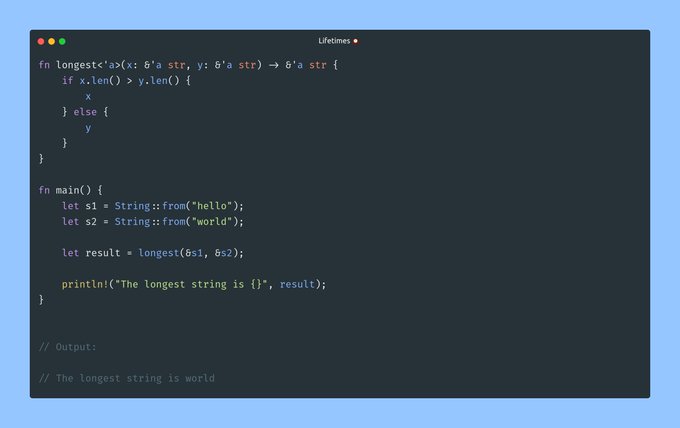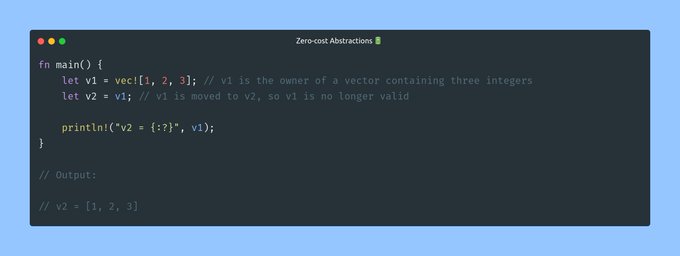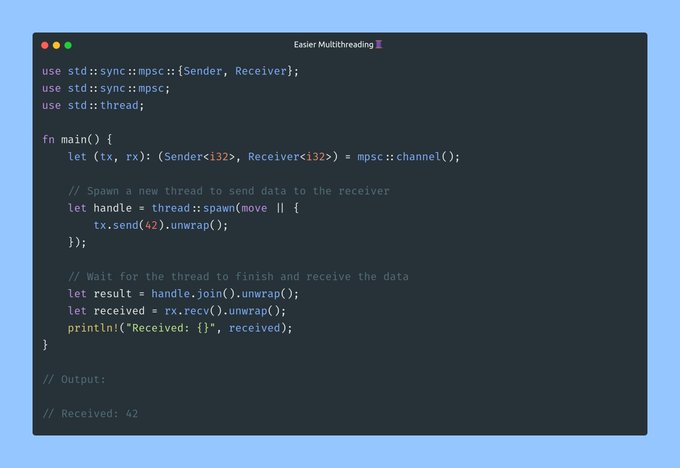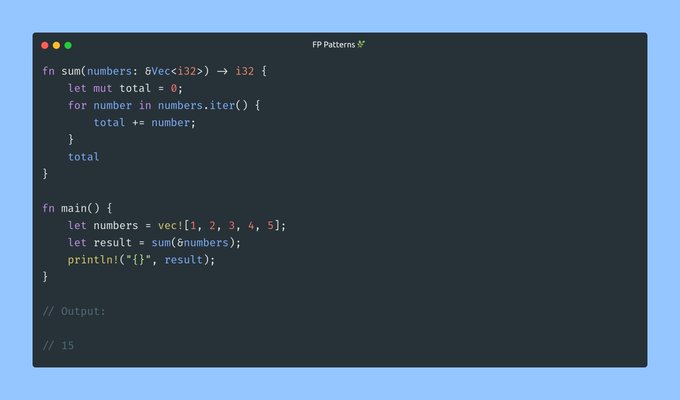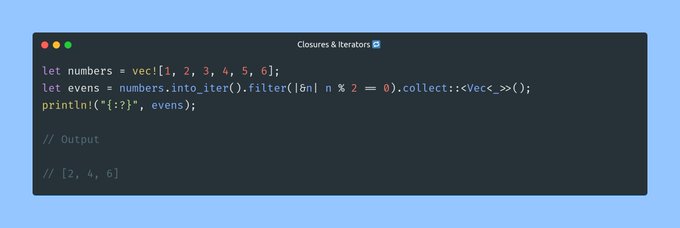🧵 Ownership
-
One Owner at a time
- When an owner goes out of scope, Rust automatically drops the value associated with that owner.
- This means that the memory used by that value is freed up for other parts of the program to use.
- This behavior is known as “automatic memory management” and is a key feature of Rust’s ownership system.
- It eliminates the need for developers to manually manage memory, reducing the risk of errors and improving program stability.
let s1 = String::from("hello"); let s2 = s1; // This following print statement result in a compile-time error since the ownership has moved to s2 println!("{}", s1); -
An owner exists in a scope
- When an owner goes out of scope, its associated value will be dropped.
- This means that the memory used by that value is freed up for other parts of the program to use.
- This behavior is known as “automatic memory management”.
let s1 = String::from("hello"); { let s2 = s1; } // s2 goes out of scope, and `s1` doesn't become invalid because ownership has been transferred to `s2` println!("{}", s1); // This will result in a compile-time error because ownership has been transferred to `s2` -
Compiler check
- Ownership is enforced by the compiler, which checks that all ownership rules are followed.
- The compiler helps to ensure that all memory is correctly managed and that there are no memory-related errors in the code.
let mut s = String::from("hello"); let r1 = &mut s; let r2 = &mut s; // This will result in a compile-time error since multiple mutable references are not allowed println!("{:?}", r1); -
Prevents dangling pointers
- the ownership model eliminates the risk of common memory errors like null pointer exceptions & dangling pointers.
- These errors can be difficult to debug and can cause serious problems, but the ownership model ensures that they cannot occur.
let s1: Option<String> = Some(String::from("hello")); let s2 = s1.unwrap(); // This will work as expected because `s1` is guaranteed to be not null, and ownership is moved to `s2` let s3 = s1.unwrap(); // This will panic because `s1` is now null and unwrapping a null value is not allowed -
Stack and Heap
- Rust uses two different parts of memory for storing values: the stack and the heap.
- The stack is used for storing values in a LIFO order, while the heap is used for storing values that can change in size during the program’s execution.
let x = 5; // `x` is stored on the stack let mut s = String::from("hello"); // `s` is stored on the heap let s2 = s1.clone(); // This creates a deep copy of `s1` s.push_str(", world!"); println!("{}", s); // This will output "hello, world!" -
Lifetimes
- In the following example, the
longestfunction takes 2 references to strings. The lifetime'ais used to ensure that the 2 references have the same lifetime, and that the returned reference is valid for as long as the inputs are valid.
fn longest<'a>(x: &'a str, y: &'a str) -> &'a str { if x.len() > y.len() { x } else { y } } fn main() { let s1 = String::from("hello"); let s2 = String::from("world"); let result = longest(&s1, &s2); println!("The longest string is {}", result); } // Output: // The longest string is world - In the following example, the
-
Zero-cost Abstractions
- Move semantics allow Rust to transfer ownership of data from one owner to another without making any copies.
- Copy-on-write (COW) allow Rust to avoid making copies of data until it is actually necessary.
fn main() { let v1 = vec![1, 2, 3]; // v1 is the owner of a vector containing three integers let v2 = v1; // v1 is moved to v2, so v1 is no longer valid println!("v2 = {:?}", v1); } // Output: // v2 = [1, 2, 3] -
Easier Multithreading
- Only one thread has mutable access to a piece of data at a time.
- Ownership allows for easy transfer of data between threads using channels.
- Borrowing rules ensure multiple threads can read from data simultsly, but only one thread can write.
use std::sync::mpsc::{Sender, Receiver}; use std::sync::mpsc; use std::thread; fn main() { let (tx, rx): (Sender<i32>, Receiver<i32>) = mpsc::channel(); // Spawn a new thread to send data to the receiver let handle = thread::spawn(move || { tx.send(42).unwrap(); }); // Wait for the thread to finish and receive the data let result = handle.join().unwrap(); let received = rx.recv().unwrap(); println!("Received: {}", received); } // Output: // Received: 42 -
FP Patterns
- Ownership rules make it easy to write functional-style code by ensuring that values are not mutated after they are created.
- This promotes safer and more predictable code, as well as making it easier to reason about.
fn sum(numbers: &Vec<i32>) -> i32 { let mut total = 0; for number in numbers.iter() { total += number; } total } fn main() { let numbers = vec![1, 2, 3, 4, 5]; let result = sum(&numbers); println!("{}", result); } // Output: // 15 -
Closures & Iterators
- Ownership rules enable Rust to have powerful language features that are both flexible and safe.
- Closures and iterators are two examples of expressive features made possible by Rust’s ownership system.
let numbers = vec![1, 2, 3, 4, 5, 6]; let evens = numbers.into_iter().filter(|&n| n % 2 == 0).collect::<Vec<_>>(); println!("{:?}", evens); // Output // [2, 4, 6]
You can refer to this Twitter thread for reference.





